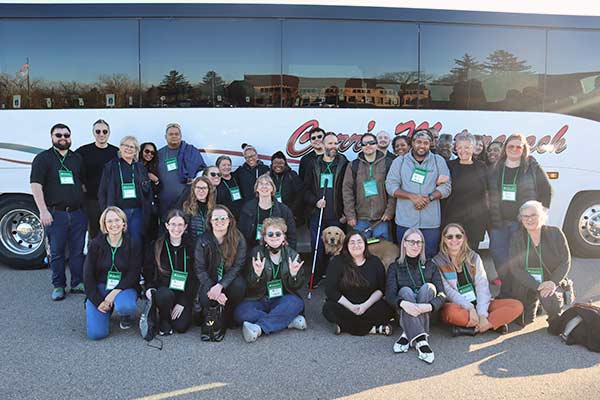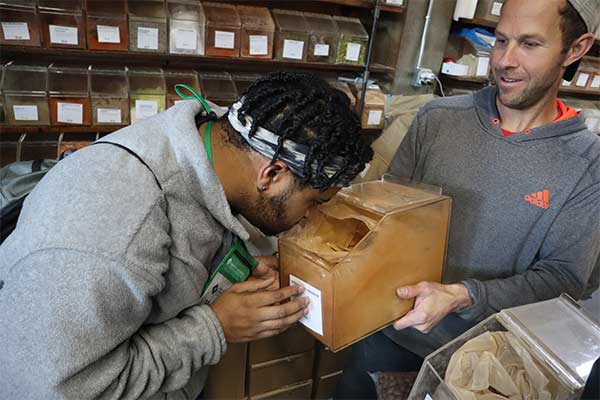OCC Sign Language Interpreter Students Venture Outside the Classroom Working with DeafBlind in the Community
The final class for OCC’s Sign Language Interpreter students was unlike any other. Instead of sitting in class with a presenter, students traveled with members of the DeafBlind community to Eastern Market to practice their skills.
~[com[27962 1 21{}]]~On board the bus were OCC Sign Language faculty, interpreters, support service providers, those who are DeafBlind and about a dozen students.
Jill Gaus hoped it would be a memorable day for all. Gaus, who is DeafBlind and has taught OCC’s Deafblind class for 11 years, said the field trip was a vision of Kelly Flores, Sign Language Interpreter Program Coordinator and Faculty who passed away in July.
“I’m so excited about this trip,” Gaus told everyone on the bus. “If I seem emotional at times, it’s because of Kelly. It was her dream to see students get out of the classroom and do something with the DeafBlind in the community.”
Learning along the way
Tour guides Linda Yellin and Lauri Sparks, with Feet on the Street Tours, kicked off the field trip at Detroit’s Eastern Market, known for its fresh food, restaurants, businesses, art and culture.
As the tour guides gave highlights about the market, OCC student Landon Smith placed his hand over Luis Pena’s hand while he signed. This method of communication, known as "tactile signing," is used to communicate with the DeafBlind through touch instead of sight. This allows the DeafBlind person to feel the signer’s handshapes and movement to convey meaning.
Smith also repeatedly tapped Luis’ shoulder, referred to as “Haptics," to communicate information about the environment that cannot be perceived through sight or hearing, such as a person smiling, laughing or yawning.

OCC Sign Language faculty, interpreters, support service providers and DeafBlind community members.
“Getting out of the classroom is a great way for us to use different skill sets that we can’t learn in the classroom and meet different people,” said Smith, a third-year student in OCC’s Sign Language Interpreter (SLI) program.
Smith works as an X-tray technician at Corewell Hospital in Royal Oak. He decided to enroll in OCC's program after he met a Deaf patient in the hallway. Smith wasn’t able to communicate with him and couldn’t find an interpreter.
“My heart went out to him,” he recalled.
Smell, taste and touch
During the field trip, the DeafBlind used their sense of smell, taste and touch to sample different types of food at Eastern Market. Below is a snapshot of some of the locations visited (View photos on Flickr)
When Instructor Gaus walked into the store, the strong fragrance of spices immediately struck her nostrils. The store carries a large variety of spices, dried fruit, fresh nuts, teas and novelty candy.
“This is amazing,” she said as she took in a deep breath. “I smell thyme, garlic, parsley and basil.”
Community participant Matty Stephens, meanwhile, had a blast smelling mild and strong spices and even dared to smell one that can bring tears to your eyes – ghost pepper. He and Nick Navalta, one of the twin owners, took a selfie that is now posted on the Twinn Spice and Nut Instagram page.

Matty Stephens smells Vietnamese cinnamon at Twinn Spice and Nut store in Eastern Market.
“I like the Vietnamese cinnamon,” he said afterward. “I use cinnamon in my own cooking and didn’t know this existed. The ghost pepper, that was a strong smell!”
Sitting at a table outside of the eatery, community participant Angelena Figueroa lifted a small plastic cup up to her nose and smelled the date before carefully picking it up and placing it in her mouth.
“The date is very chewy, like a giant raisin,” she told a sign language interpreter.
Sitting beside her, community participant Antoinette Adkins used a plastic fork to try spinach pie for the first time. She said tasting it was the best part of the field trip.
“Usually, I don’t like spinach, but this I like,” she said with a big smile.
Since 1887, patrons have shopped at this store, known today for its large selection of cheeses from over 14 different countries and unique products from around the world.
The DeafBlind sampled Cotswold English cheddar with chives, Prairie breeze cheddar from Iowa, and Hoffman hard salami before going up to the third floor on the Otis elevator, one of the oldest working freight elevators in Detroit and Wayne County.
“It’s not too often the DeafBlind get to go out,” said Joanne Forbes, OCC Sign Language Interpreting Program Coordinator. “DeafBlind are allocated limited hours a month through the state to obtain appointments with their special service providers (SSP) or known as Co-Navigators (CN), and they specifically use it for errands, such as grocery shopping or to run errands. For opportunities to use SSP/CN for entertainment purposes does not happen that often.”
Fostering a culture of belonging
OCC’s Office of Diversity, Equity, Inclusion & Justice organized the experiential learning trip as a way to promote cultural awareness and
accessibility across the College.
“This isn’t just about a specific class or event, but about fostering a culture of
belonging where individuals with diverse abilities are recognized and respected throughout
our OCC community,” said Kristina Marshall, the College’s Director of Diversity, Equity,
Inclusion and Justice.
She highlighted that OCC employees are encouraged to review the OCC Guide: Best Practices for Communicating with Deaf and Hard of Hearing Individuals. The guide provides valuable strategies for bridging communication and cultural gaps, empowering staff to foster more inclusive and respectful interactions with Deaf and hard of hearing colleagues and students.
Working with the DeafBlind
Exercises done in class helped prepare students for the experience. They practiced wearing blindfolds and earplugs while silently making peanut butter and jelly sandwiches and participated in a scavenger hunt on campus while blindfolded. They also studied the basics of Human guide, Haptics and other forms of communication with the Deaf and DeafBlind.
On the day of the tour, student Jayce Berg experienced firsthand what it is like to serve as a human guide for David Gentry.
“Being out on the streets of Detroit and not knowing what the cars are going to do and walking in stores with crowds of people gave me a real-world experience of what it’s like to work with a DeafBlind person,” Berg said.
Students working with the DeafBlind had varying levels of experience. Jasmine Knight, who graduated from the program in December, returned to help interpret while Sabrina Boykin is already a certified interpreter but wanted to take OCC’s DeafBlind class.
Students were graded on their interpreting skills, Haptic signals, human guiding and allowing the DeafBlind to make choices and be independent.
“The students are actively working with different DeafBlind individuals and seeing that their communication needs are different,” Gaus said. “For many of the DeafBlind, they are doing things here they have never done before.”
Figueroa said she appreciated the opportunity to go on the field trip to Detroit with other DeafBlind individuals.
“Often DeafBlind people are isolated and today is really special because we get to be in contact with one another and make new friends,” she said. “It also gives our tour guides an opportunity to socialize with DeafBlind people. It’s a win-win situation for everyone.”
For more information about OCC’s Sign Language Interpreting program and the College’s Office of Diversity, Equity, Inclusion and Justice, visit oaklandcc.edu.
About OCC
Oakland Community College offers more than 80 degrees and certificates programs with the resources students need to be successful and advance our community. As a top transfer institution, OCC offers one of the state’s most affordable tuition rates and flexibility in scheduling. The College is nationally recognized for its high-demand career training and expert faculty in their fields. More than 1 million students have enrolled in the College since it opened in 1965. Learn more at oakland.edu.
###
Media Contact: Marketing & Communications | 248.341.2020 | contactus@oaklandcc.edu